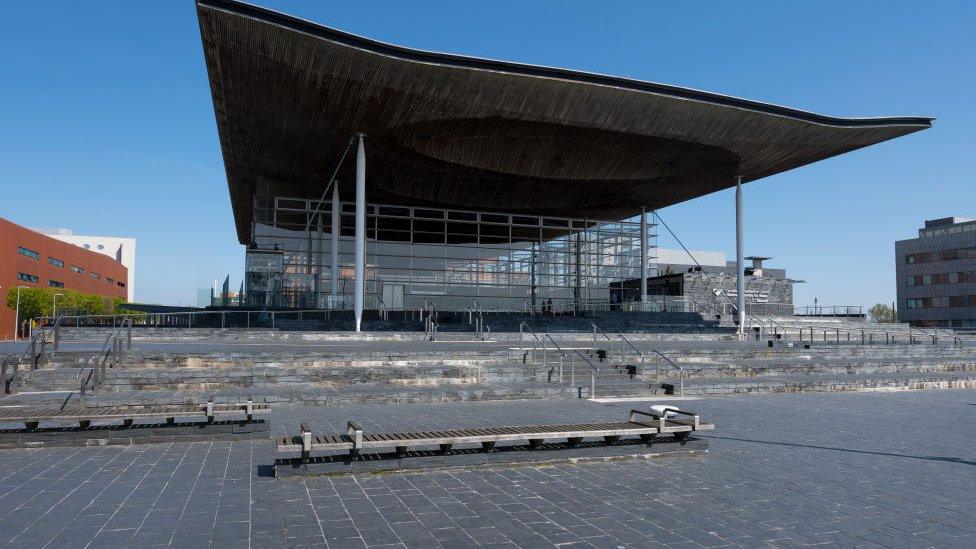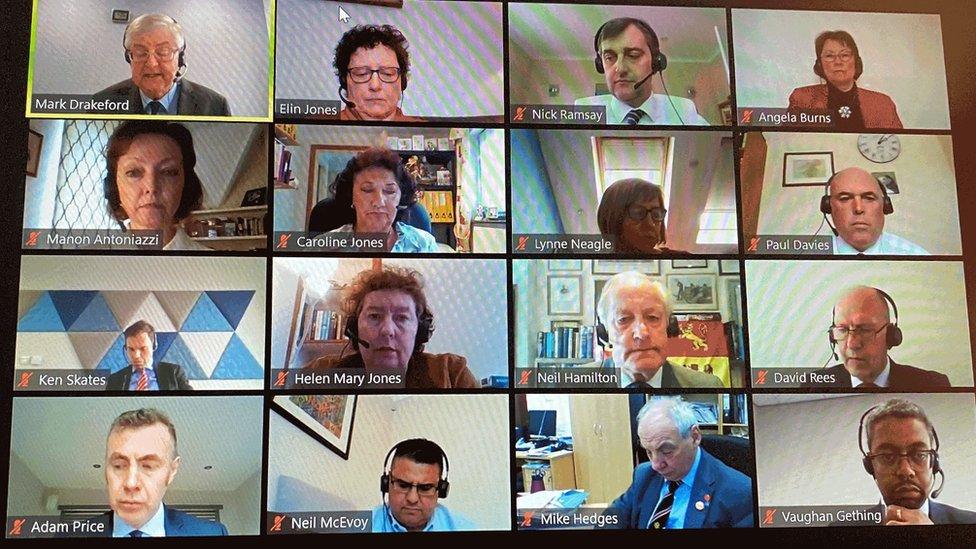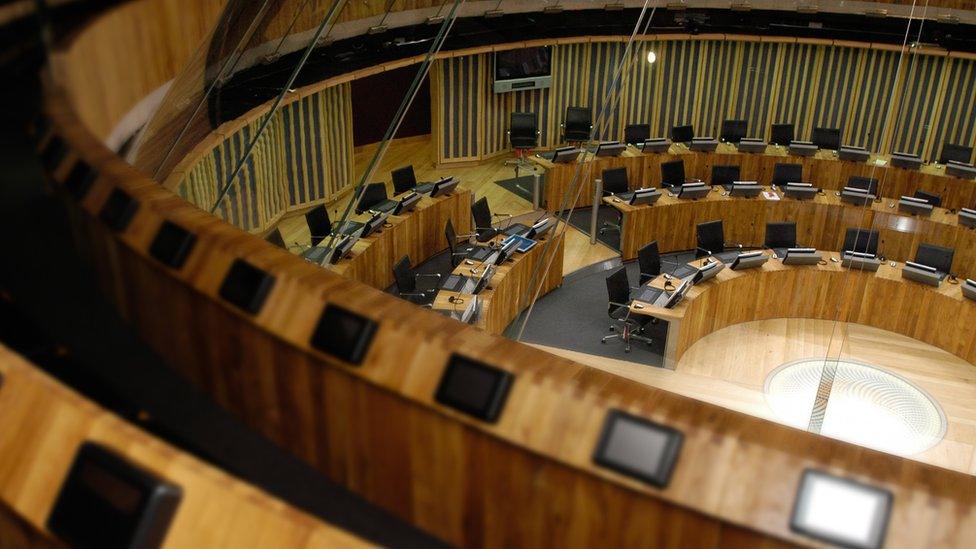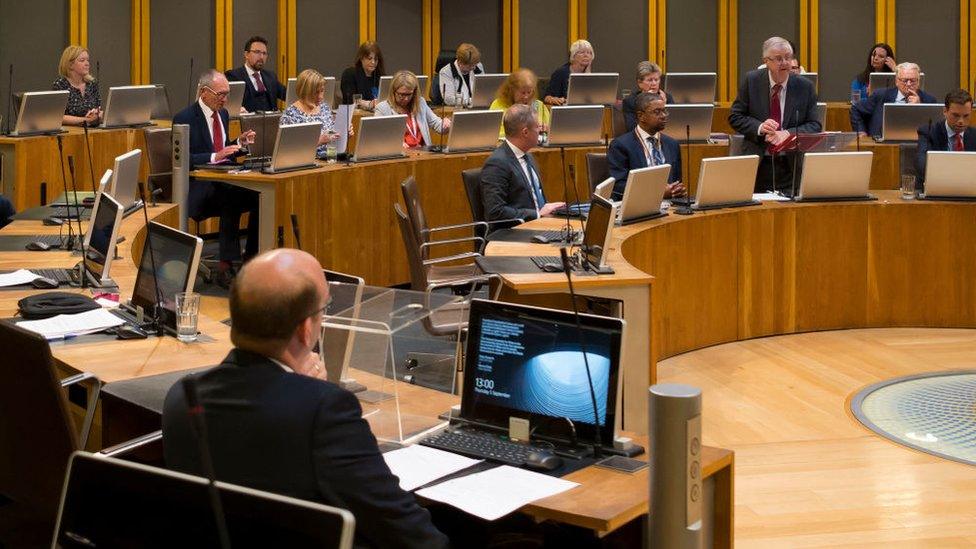Welsh assembly renamed Senedd Cymru/Welsh Parliament
- Published

Wednesday is the first day of the Welsh Parliament, also known as the Senedd Cymru
The National Assembly for Wales has changed its name to Senedd Cymru - the Welsh Parliament.
The Senedd's figurehead, Presiding Officer Elin Jones, said the new name reflected powers and responsibilities the institution has gained.
It comes after 21 years of devolution that have seen law-making and taxation powers handed from London to Cardiff.
The names of the politicians will also change - from Assembly Members (AMs) to Members of the Senedd (MSs).
Plans to rename the assembly - fixed to 6 May 2020 - entered the statute books months before the coronavirus emergency.
The pandemic means the change itself will be low-key - with the Senedd closed and politicians meeting virtually. Even the name on the front of the building will stay the same, for the time-being.
The Senedd Commission, which is in charge of the day-to-day running of the institution, estimates the net cost of the name change to be £294,600 over five years.
Ms Jones said responding to coronavirus remains the Senedd's priority. "Now, more than ever, our citizens expect a strong national parliament working for Wales," she said.
The institution is very different to the one set up in 1999, she said.
"With full law-making powers and the ability to vary taxes, the new name reflects the Senedd's constitutional status as a national parliament," she added.
Law making powers over a large swathe of Welsh life, including health, education and local government, were granted following a referendum in 2011.
Ministers in the Welsh Government, made up of MSs from the governing party, now also have powers to vary income tax - measures that can be scrutinised by the Senedd.

The Senedd has been meeting virtually during the pandemic
The assembly says the two terms - Senedd Cymru and Welsh Parliament - have "equal standing".
First Minister Mark Drakeford endorsed the rebrand in a tweet, external: "More than 20 years into our devolution journey, the Senedd will finally have a name which reflects its status."
Sian Gwenllian, Plaid Cymru MS for Arfon, said it was an "important milestone in our democracy, in which our national Parliament takes on a name that reflects its full law making powers".
Welsh Conservative assembly leader Paul Davies said celebrations, given the pandemic, would not be appropriate. But he hoped the official change "will make its responsibilities much clearer, emphasising the separate duties between the legislative body and the Welsh Government".
But Mark Reckless, Brexit Party group leader and MS for South Wales East, said the measure would not "raise the profile of the Senedd/Assembly" which will be seen as an "inward looking, self obsessed bubble", but said the new name for a law-making body was "appropriate".

The Senedd's new logo

An expert on devolution said the decision could be of "some help" to people in grasping what the assembly does.
Roger Awan-Scully, professor of politics at Cardiff University, said "the term 'assembly' in British political discourse at least has been generally understood to indicate a less powerful body than a major law-making parliament".
He added: "The fact that this in now renamed Senedd Cymru, the Welsh Parliament may to some degree, maybe even subconsciously, help people get the sense that this is an institution that passes laws, that has a really substantial effect on people's daily lives."

Proposals to rename the assembly date back years. Former Welsh Conservative assembly leader Andrew RT Davies called for it to be renamed Welsh Parliament in 2012.
It was not until 2017 that UK government legislation gave the assembly substantial control over its own affairs, effectively permitting AMs to change what the assembly was called.
Welsh Parliament was backed in a consultation, but a debate grew about whether the assembly should have a Welsh-only name - Senedd. That was supported by the presiding officer, the Plaid Cymru group and a small number of Labour backbenchers.
A compromise of Senedd Cymru/Welsh Parliament was proposed by former First Minister Carwyn Jones and was agreed in October, supported by most Labour AMs including ministers, the Welsh Conservatives and the Brexit Party - although the latter two parties did not support the resulting law over disagreements with the rest of the bill.
Carwyn Jones said he himself would use the name Senedd but felt some would not understand the term.
It was already, and remains, the name of the building that houses the parliamentary chamber.


Owain Glyndwr was reputedly crowned prince of Wales at a parliament in Machynlleth in 1404
'An historic moment'
By Vaughan Roderick, BBC Welsh affairs editor
While changing the name of Wales' legislature from an assembly to a parliament doesn't involve any major changes to the body or its powers, it's still regarded as an historic moment for Wales and a culmination of a century and a half of campaigning by the supporters of devolution.
Wales' last Parliaments were convened in Machynlleth and Harlech in the 15th Century during Owain Glyndŵr's rebellion against the English crown. In modern times it was David Lloyd George's Cymru Fydd movement that were the first to call a new Welsh Parliament to be established in the 19th Century.
The cross-party Parliament for Wales Campaign launched in the 1950s, alongside electoral successes for Plaid Cymru, put devolution firmly on the agenda but Labour governments in both the 1970s and 1990s chose the less controversial term 'assembly' to appease devo-sceptics within the party.
While the legislature's new name is officially Senedd Cymru/Welsh Parliament it's likely that, at least within Wales, it will be referred to as the Senedd, a name that's already in use in both languages and which will differentiate it from Westminster.
- Published6 May 2020
